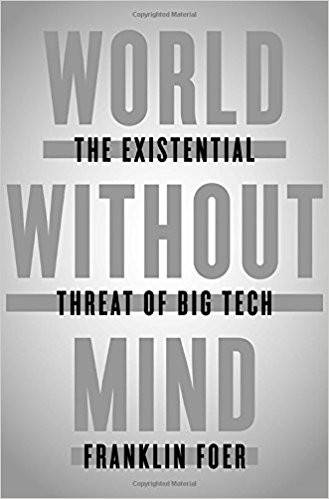You have /5 articles left.
Sign up for a free account or log in.
 World Without Mind: The Existential Threat of Big Tech by Franklin Foer
World Without Mind: The Existential Threat of Big Tech by Franklin Foer
Published in September of 2017.
EdTech people should read World Without Mind. We should ask ourselves, is edtech doing to higher ed what the fearsome four (Google, Apple, Facebook and Amazon) are doing to media, publishing, and the associated information industries?
What makes World Without Mind such an excellent book is how little objectivity Foer brings to his analysis. This is a book framed by the loss a a business model, that of of the weekly small circulation / high cost-to-produce weekly paper news magazine.
As editor of The New Republic, Foer was unable to find a path towards economic viability. Hired and then fired by Facebook co-founder Chris Hughes during his brief ownership of the magazine, Foer provides an insider view on the cultural price we pay for our reliance of on the new digital bundlers and gatekeepers of Amazon/Google/Facebook/Apple.
We in higher ed need to ask ourselves if academia will inevitably follow journalism? Academics and journalists are not all that different. Both make their living through trading their expertise, in the form of writing (journalists/academics) and teaching (academics), for money. At some point, somebody has to be willing to pay for what we academics and journalists have on offer.
What will happen when the economics of the digital economy come for academia?
Amongst Foer’s most passionate critiques in World Without Mind is our transition from an information scarce to an information ubiquitous society. This shift has radically driven down the cost that individuals are willing to pay for information, as ad driven platforms such as Facebook and Google News substitute user generated for expert produced content.
Even more concerning for Foer is the power that Amazon exerts over the world of publishing, with their control of the largest retail channel for physical books and their monopoly on digital books. Foer's solution is to read only paper books, purchased I imagine at an independently owned bricks-and-mortar local bookstore.
World Without Mind is a wonderful polemic, but offers very little in the way of ideas for constructing a positive future on top of our new digital economic realities. Is it really true that journalism is doomed by the proliferation of screens and the elimination of friction? Or might the next journalism find a way to combine the best parts of expert journalistic writing and editing, with the velocity and community made possible by today’s digital platforms?
Similarly, will we in higher ed find a way to retain what is most valuable about our colleges and universities - while also discovering how we might utilize the affordances of digital platforms in our teaching, research, and credentialing?
How do you think this is all going to play out? Do you share my optimism that we will figure out how to harness the benefits of technology to finally deliver on the promise of higher education for more of the world’s population? Or are you with Foer, believing that the inevitable gravity of digital economics, and the uncritically accepted narratives of the edtech purveyors, will end up hollowing out higher education?
As a profession, edtech needs to be more self-critical. Perhaps reading World Without Mind is one place to start.
What are you reading?




